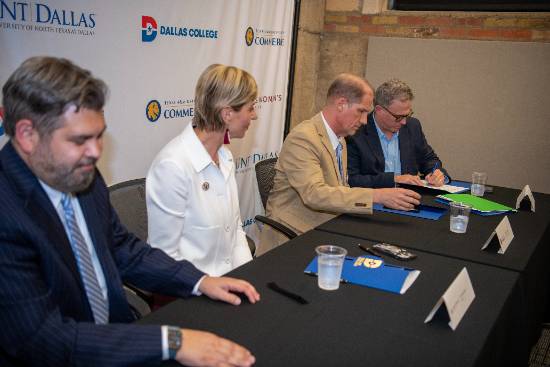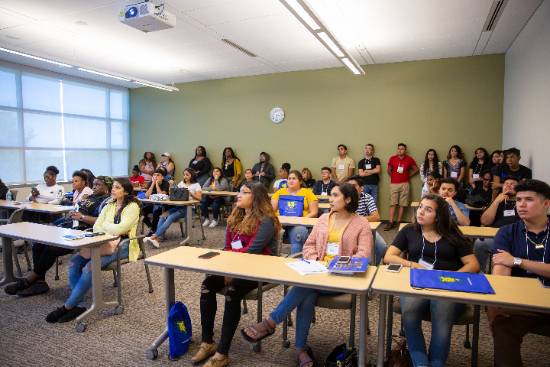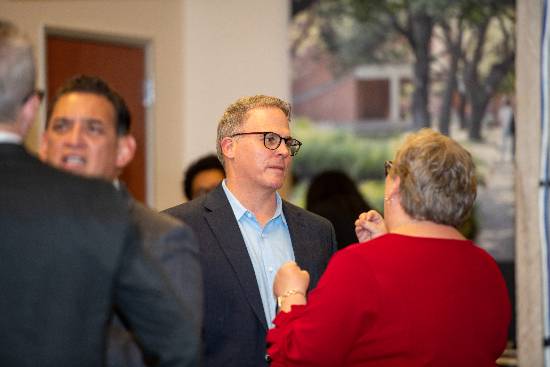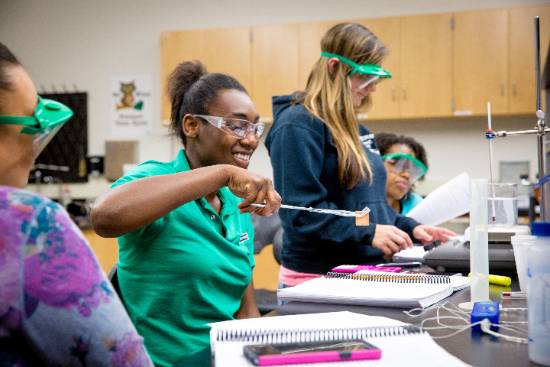New Partnership Will Make Transferring to UNT Dallas Easier and Faster
July 26, 2024
Transferring to UNT Dallas from Dallas College in pursuit of a four-year degree will be faster and easier because of a new partnership among several North Texas higher education institutions. Known as the Dallas Transfer Collaborative, the partnership aims to help students successfully earn their bachelor’s degrees on schedule and with reduced financial burden.
"This agreement is truly greater than the sum of its parts," said Dr. Warren von Eschenbach, UNT Dallas president. "We are building a bridge between two- and four-year institutions."

Leaders from UNT Dallas, Texas A&M University-Commerce, Texas Woman’s University (TWU) and Dallas College signed the collaborative agreement on Thursday, July 25, 2024. Through the agreement, the four higher education partners have committed to a shared governance structure, academic alignment, real-time credit-to-degree technology, coordinated advising and student success services, and data sharing.
“While many students enter community college intending to transfer to a university in pursuit of a bachelor’s degree, the complexities of the transfer process mean that far too few of them are able to do so,” said Dr. Justin Lonon, chancellor of Dallas College. “Our collaboration aims to rectify this situation by collectively simplifying our transfer pathways and developing targeted associate degrees that map to multiple bachelor’s programs.”
UNT Dallas already accepts many transfer students from Dallas College's seven campuses. Moving forward, we expect to enroll even more, many of whom might skip a four-year university if the transfer process were too difficult. UNT Dallas values our relationship with Dallas College and believes the Collaborative and the new Transfer Hub technology will simplify and speed up the transfer process. As a result, UNT Dallas anticipates serving an increasing number of Dallas College students who want to earn their four-year degrees here.

Supported by initial funding from the Commit Partnership’s Opportunity 2040 Fund and JP Morgan Chase, the collaboration includes new programs and technologies designed to simplify a student’s transfer journey from community college to a university and into the workforce.
“To reach our ‘true north’ goal of at least half of all 25-to-34-year-old residents of Dallas County earning a living wage by 2040, we must help more students attain postsecondary credentials and begin productive careers in high-demand fields, with a special focus on students who are currently experiencing economic disadvantage,” said Todd Williams, CEO of Commit Partnership.
Preventing Lost Credits: Meta Majors and Transfer Hub Website
The first phase of the new collaboration begins this fall with the introduction of simplified programs of study, or Meta Majors, between Dallas College and university partners. These Meta Majors feature mutually agreed-upon blocks of lower-division courses that will be accepted for credit toward several related majors. Emphasizing high-demand fields, the first set of Meta Majors will launch in business, education and health sciences in late August.
Later this year, the collaborative will also launch a transfer hub website, including resources and information required for transfer to Texas A&M University-Commerce, Texas Woman’s University, UNT Dallas, and other institutions. "UNT Dallas is thrilled to be the first institution in this collaborative to launch the new student transfer portal called The Transfer Hub. The website went live on June 14," said Dr. von Eschenbach. "Feedback from students led our UNT Dallas team to search for technology that would empower them."
The site will include real-time credit-to-degree technology, allowing prospective students to quickly and easily see how their credits will transfer into degrees at participating institutions and view their progress toward degrees.

“These first two components—Meta Majors and the transfer hub website—will help prevent students from losing transfer credits and will help meet the immediate planning needs of prospective transfer students,” Dr. von Eschenbach explained. “Loss of credit, specifically due to not meeting degree requirements, has emerged as a major barrier to success for transfer students as they often struggle to figure out what lower division credits will transfer and apply to different majors and at different universities,” he added.
In fall 2022, the Texas Higher Education Coordinating Board reported that more than 13,000 Texas students who transferred from a two-year public institution to a university did not receive course credit for at least one lower division-level course. The most frequently reported reason for credit denial was that courses fell outside specified degree requirements. In that semester, more than 21,000 courses were denied credit for that reason.
Future Plans for “Friction-Free” Transfers
After its first year, the Dallas Transfer Collaborative plans to develop and launch further Meta Majors, including STEM/IT, and explore the development of more streamlined transfer processes and transfer-specific student success supports.
“The overarching aim of the Dallas Transfer Collaborative is to make the transfer process as simple and easy to follow as possible,” said Dr. Carine Feyten, chancellor of TWU. “At the same time, we want to give prospective transfer students a broad range of attractive options in terms of academics, degrees, campuses, and cultures.”
“For many years, the partners in the Dallas Transfer Collaborative have shared a commitment to improving social mobility,” added Dr. Mark Rudin, president of A&M-Commerce. “With this new partnership and program, our long-term vision is a transfer-friendly ecosystem that is ‘friction-free’ for students.”

One of UNT Dallas’s primary goals is to ensure students are career-ready and enter the workforce fully prepared for the opportunities and demands ahead. Employers are seeking job candidates with four-year degrees, which are increasingly necessary in today’s quickly evolving, technology-focused workplaces.
UNT Dallas’s rigorous academic programs, experienced faculty, and experiential learning offerings mean students will earn degrees that set them up for success in high-demand jobs in DFW and beyond. We are confident that UNT Dallas, with support from the Dallas Transfer Collaborative, will help grow the pipeline of career-ready, degreed professionals for the DFW workforce.